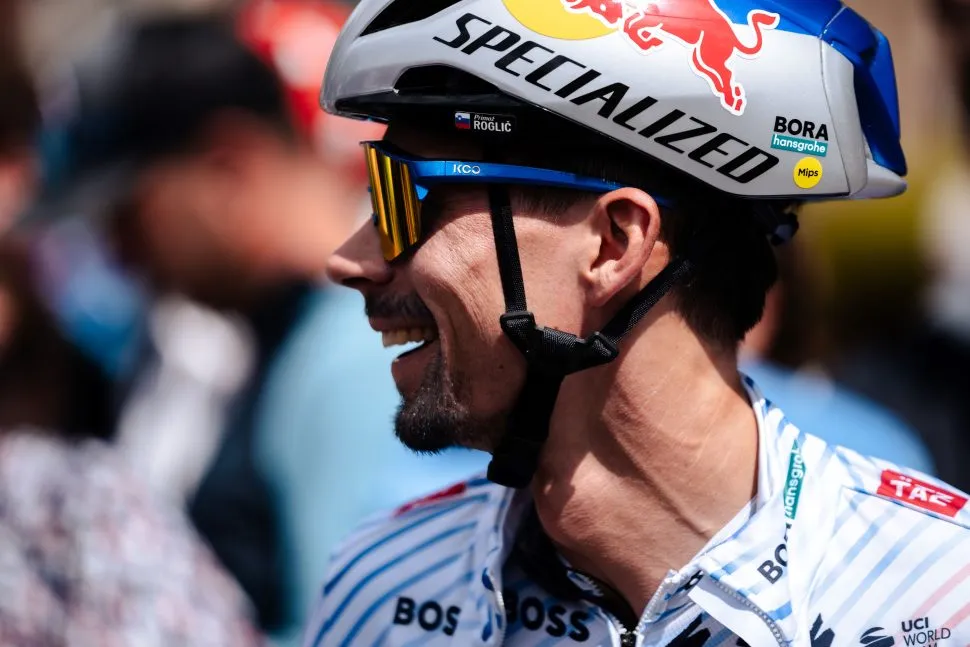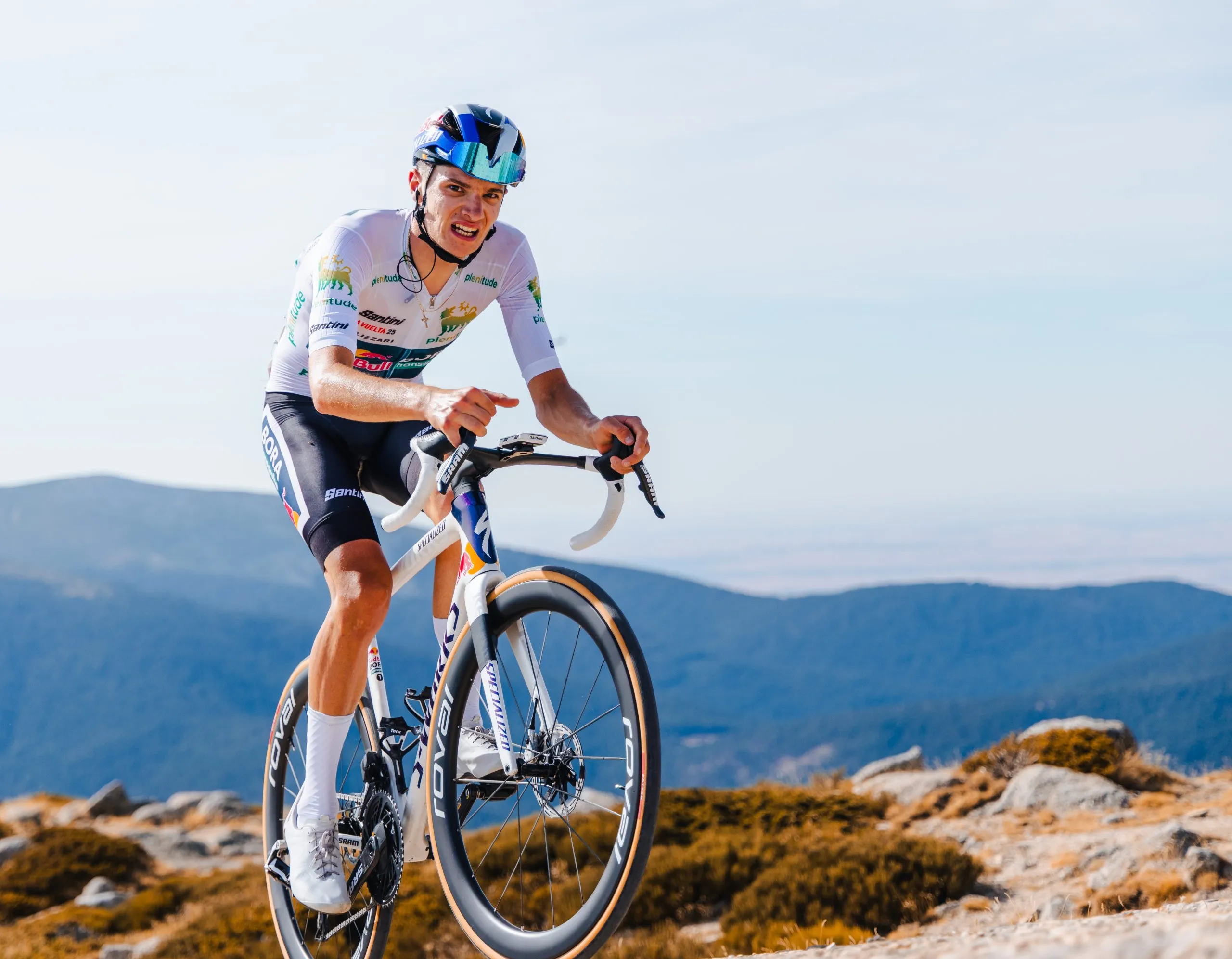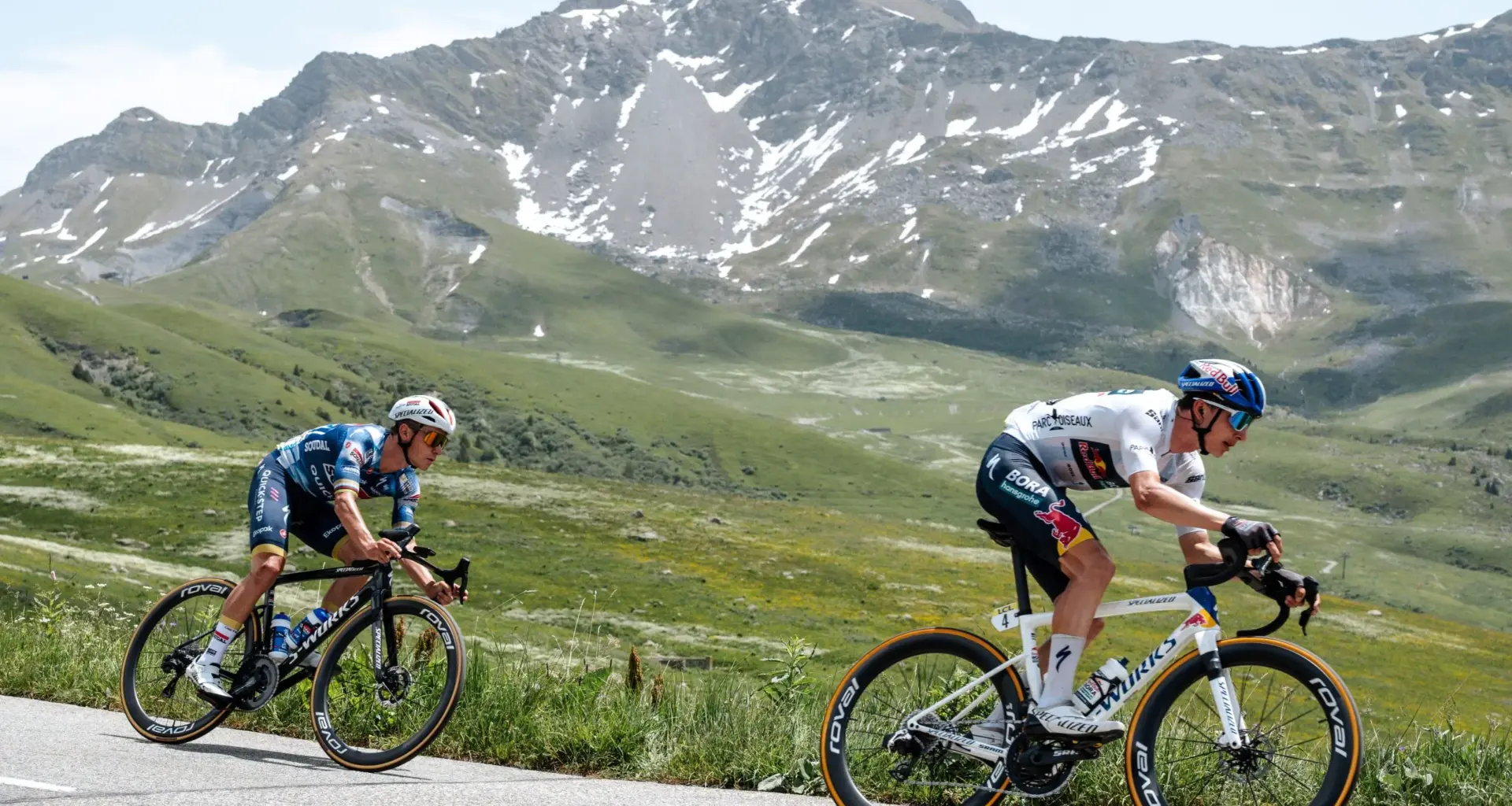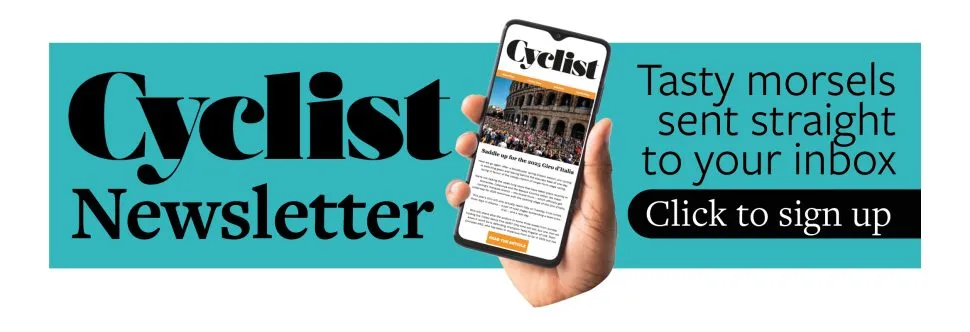When Bora-Hansgrohe added Red Bull as a lead sponsor in 2024, their ambitions were clear. They wanted to rival UAE Team Emirates XRG and Visma-Lease a Bike on cycling’s biggest stage.
The energy drink giant, which has reported annual revenue of €10 billion, now owns 51% of the team. With their financial injection, the team’s budget has risen to a rumoured €50 million. Evidence of this cash was apparent in the past two years’ transfer windows, culminating in a fleet of star signings, including Primož Roglič and Remco Evenepoel. On top of this, the collaboration with Red Bull hands the team access to the company’s sporting network, which includes performance centres in Austria and California.
Now that the team has bolstered its roster, the team is bullish about living up to its superteam status. Under the Red Bull name, the team has continued to climb up the UCI rankings, but they appear a fair way behind Visma-Lease a Bike and UAE Team Emirates. Roglič claimed a Grand Tour win at the 2024 Vuelta, and Florian Lipowitz bagged the team’s best Tour result in 2025, with a white jersey to boot, but they’re still a step behind Tadej Pogačar and Jonas Vingegaard.
As Evenepoel prepares to join the German outfit, he brings an enhanced leadership dilemma. Who will lead the team going forward, and how can Red Bull-Bora-Hansgrohe maximise their chances in the Grand Tours next year?
Related questions you can explore with Ask Cyclist, our AI search engine. If you would like to ask your own question you just need to , or subscribe.
If you would like to ask your own question you just need to , or subscribe.
Too many cooks in the kitchen?
 Xavier Pereyron
Xavier Pereyron
After receiving WorldTour promotion in 2017, Red Bull-Bora-Hansgrohe have been one of the fastest-growing outfits on the sport’s top tier. Where they once boasted a humble leadership strategy underpinned by Emanuel Buchmann and Rafał Majka, the team now offers a burgeoning lineup of A-list leaders. In the coming years, this looks likely to grow, with the success of Red Bull’s two development teams, which continue to dominate the under-23 and junior ranks.
In 2026, the team will be home to Evenepoel, who broke his contract with Soudal-QuickStep early as part of a multi-million Euro deal. The Belgian follows in the footsteps of Roglič, who similarly left Visma-Lease a Bike early to join Bora’s ranks. Throw in a Tour de France podium finisher, and Red Bull-Bora-Hansgrohe have several credible options for leading a Grand Tour.
The team have several key players lurking behind this leading trio. Jai Hindley won the Giro d’Italia in 2022, and came close to finishing on the podium at this year’s Vuelta a España. He’s also the most recent Red Bull rider to claim a Tour de France stage victory. Dani Martínez has also finished on the podium of the Giro, while Sasha Vlasov has come close in the past too. They also have another rising star in 21-year-old Italian Giulio Pellizzari, who, after initially riding in support of Roglič, had a breakthrough in the final week of the Giro and then backed that up at the Vuelta to finish the year with sixth overall in two Grand Tours.
As the team pad out their climbing provisions, Red Bull have somewhat sacrificed their sprinting ambitions in recent years, with Sam Bennett laid off in 2023 and Sam Welsford expected to part ways with Ralph Denk‘s project at the end of 2025. Jordi Meeus is now the leading sprint name, but he’s not quite on a level to challenge the likes of Jasper Philipsen or Jonathan Milan to a Tour de France green jersey.
With these resources on board, Red Bull justify their superteam status. However, in comparison to UAE and Visma, who have more distinguished hierarchies, Red Bull-Bora-Hansgrohe still has to tackle its leadership dilemma.
Who rides the Tour de France?
 Xavier Pereyron
Xavier Pereyron
With the unveiling of the 2026 Tour de France route last week, talks have centred on the squad’s selection for next year’s race. As the sport’s biggest spectacle, and the jewel crown of the calendar, the team need to deliver at the Tour to justify sponsor investment and the team’s ambitious list of off-season recruits.
After the parcours presentation in Paris, the team made it clear that a decision was still pending, stating, ‘We’ll now wait for the routes of the other Grand Tours [to decide our Tour leader]’. This has put speculation on ice for now, but as the squad meet up in Salzburg at a team-building camp, staff and riders have sent the first signals.
Lipowitz was quoted in German site Cyclingmagazine, disclosing that ‘the Giro is not on the agenda’. Instead, he confirmed that a Tour start is still the goal. New sports director Zak Dempster, who moved across from Ineos this year, told Daniel Benson, however, that he’s ‘trying to understand what the Giro and the Vuelta look like, where they stand as riders, and how we can maximise their winning potential’.
The Tour’s route suits Lipowitz on paper, with a small amount of time-trialling and a string of heavy-hitting mountain stages in the final week. Lipowitz is often praised for his fatigue resistance in races, so the backloaded parours should suit his chances in searching out another podium finish.
On the other hand, Evenepoel might be disappointed by the Tour’s route. There’s only a handful of flat TT kilometres, punishing the traditional strong suit of the three-time world time-trial champ. The Alpine showdown could also be viewed as a disadvantage for Evenepoel, as is the lack of punchy finales akin to the Ardennes Classics.
What Dempster leaves open, however, is the prospect of a co-leadership strategy. He told Benson that ‘if you have Evenepoel and Lipowitz up there in their top shape, I know that it would be a co-leadership strategy’. This keeps both parties on board, but would this really be the best way to maximise the squad’s all-star roster in a sporting sense?
Maximising the Evenepoel investment
 Xavier Pereyron
Xavier Pereyron
While the Tour de France’s route is relatively unattractive for Evenepoel, Red Bull-Bora-Hansgrohe have invested a lot to bring him in. With his star power, it would be strange to see Evenepoel skip the race. With the world watching, Evenepoel would start as the biggest name among the Red Bull roster, even if he falls short in the GC final picture. From a marketing front, it would feel counterproductive to sideline him for the world’s biggest race.
It’s uncertain what the Giro map could look like, but more individual time-trialling kilometres are expected in the Giro in comparison to the meagre 26km length in the 2026 Tour de France. In that case, it could be worthwhile to send Evenepoel across to the Corsa Rosa. There, Evenepoel would be one of the key favourites, with a genuine shot at winning the maglia rosa.
A Giro foray, along with a potential Ardennes block and a Tour return, could front-load the Belgian’s season too much. Pogačar proved in 2024 that it was possible to sustain form through this heavy programme. However, is Evenepoel really comparable to the four-time Tour winner, who appears more Merckxian by the minute?
Surrendering to Pogačar
 Xavier Pereyron
Xavier Pereyron
Given the strength of Pogačar and his imperious UAE squad, is there really any point in fielding your A-team to the Tour de France?
Red Bull’s ceiling at the Tour is third place, behind the inevitable duo of Pogačar and Vingegaard. In that case, there’s no need to pile all the team’s resources into the Tour de France from an efficiency perspective. Even with all their spears of attack, it’s hard to imagine Hindley or Pellizzari being the key to toppling Pogačar, whose tight-fisted grip on the Tour has no sign of loosening over the next season.
Regardless of whether it’s Roglič, Lipowitz or Evenepoel who takes on this task, finishing third at the Tour de France is the best-case scenario. You could argue that the team need to concentrate their resources on securing that result, but we saw this year that Lipowitz is capable of riding onto the podium with reduced team support. The same could be argued for Evenepoel at the 2024 Tour de France when he was at QuickStep.
Instead, Red Bull’s best shot at bagging a Grand Tour, or any position higher than second place, seems to be the Giro or Vuelta. In my eyes, the German squad should go all in for these three-weekers. This would be the most effective way to both score points and secure top Grand Tour results across the board.
A change in role for Roglič
 Xavier Pereyron
Xavier Pereyron
What seems apparent in the talks of Evenepoel and Lipowitz’s split leadership is the likelihood that Roglič will be pushed out of the Tour de France roster. The Slovenian seems to know this, but his team still keep the door open to another stab at the Tour.
‘We’re going to focus on making a plan for him that will allow him to win the most important races, and that includes the most important WorldTour events and one or two Grand Tours,’ Dempster said when asked about Roglič in Daniel Benson’s Substack.
For Roglič, there’s one obvious objective in the Grand Tour cycle: the Vuelta. If he were to win that again, he’d become the most successful rider in the Vuelta’s history. At the moment, it’s looking unlikely that either Pogačar or Vingegaard will rock up to the Vuelta, with the Dane opting for a Giro debut instead. This opens the door for weaker opposition and a real chance for Roglič to enter the history books.
Where I agree with Dempster is on the WorldTour race front. Since joining Red Bull, the Slovenian has competed in a reduced schedule, focussing on just one or two warm-up races per year. With the Tour and Giro wiped out of the schedule – also as a safety precaution – Roglič is free to pick up major stage race results throughout the spring and early summer period.
This is, after all, where he’s thrived since his big WorldTour splash in 2018. If Pogačar and Vingegaard opt for thinned-out programmes – which is likely given the former’s Classic goals and the latter’s busy Grand Tour rota – Roglič could be left to contest the likes of the Volta a Catalunya, Tour de Suisse and Tour de Romandie in relative peace. Alongside his own boost in morale, this will help Red Bull pick up valuable UCI points.
The background characters
 Harry Talbot
Harry Talbot
Besides the three aforementioned leaders, several names within Red Bull have appeared at the forefront of Grand Tours in recent years.
Pellizzari took a huge leap forward in 2025, becoming the only Red Bull rider to finish inside the top ten overall at two Grand Tours. Soon to turn 22, the Italian is a massive talent who’d no doubt have a chance at complete leadership at plenty of other WorldTour teams. For now, he’ll have to play second (or third) fiddle on paper behind Evenepoel or Lipowitz.
Martínez was incredibly disappointing in 2025. Perhaps his podium finish at the Giro was hard to follow up, but he has shown little evidence of replicating that feat next year. Instead, I’d hand him some top stage race appearances ahead of Grand Tour domestique duties. The Giro’s a natural fit – as part of a blockbuster team led by Evenepoel – given the Colombian’s poor record at the Tour de France historically.
As for Hindley, the team’s first Grand Tour winner, he could double up as a back-up leader at the Giro. Evenepoel’s hardly the most consistent at three-weekers, so having Hindley on board for the Giro could be a wise idea. The Australian has always thrived on Italian soil, having lived there as a teenager, and he was back on podium level at the 2025 Vuelta. Pair him up with Evenepoel, and Red Bull could possess a lethal weapon in the face of Vingegaard’s Visma-Lease a Bike, who could bring Simon Yates to perform a similar role.
Our rosters
 Xavier Pereyron
Xavier Pereyron
Giro d’Italia: Remco Evenepoel, Jai Hindley, Giulio Pellizzari, Aleksandr Vlasov, Daniel Martínez, Mattia Cattaneo, Gianni Moscon, Nico Denz
This really is the cream of the Red Bull crop. Evenepoel’s the clear leader here, but Hindley and Pellizzari provide two luxury domestiques who could wiggle their way into the top ten overall. Vlasov and Martínez add extra firepower in the mountains to fend off any challenges from Visma or UAE – who could be running B-teams in favour of the Tour de France. Moscon and Denz can regulate the pace on the flat and protect Evenepoel if anything were to go wrong. Knowing Remco’s record, that’s probable.
Tour de France: Florian Lipowitz, Remco Evenepoel, Danny van Poppel, Mattia Cattaneo, Jan Tratnik, Gianni Vermeersch, Maxim Van Gils, Jordi Meeus, Oier Lazkano (if he stays)
Realistically, Red Bull need to rely on UAE and Visma in the mountains. That means mountain support will be less important than it would be in the Giro or Vuelta, where the team will be required to take things on.
To be safe, I’ve opted with both Lipowitz and Evenepoel for the Tour de France. Remco brings star power, but Lipowitz has the consistency to reach the podium. This might be an unpopular opinion, but I reckon Evenepoel would be a great domestique for Lipowitz in the mountains. Cattaneo brings some back-up in the mountains, but there’s an emphasis placed on scoring wins from the breakaway with the inclusion of Vermeersch, Van Gils and Lazkano. Stage hunting has been a real thorn in Red Bull’s side at recent Tours, so if they can manage a podium finish and a couple of stage victories, the Tour can be considered an improvement on 2025.
Vuelta a España: Primož Roglič, Jai Hindley, Giulio Pellizzari, Finn Fisher-Black, Laurence Pithie, Giovanni Aleotti, Ben Zwiehoff, Tim van Dijke
Pellizzari and Hindley worked well together at the 2025 Vuelta. As a duo, they can support Roglič in his attempt to claim a historic fifth Vuelta. However, if anything were to happen to the veteran Slovenian – a crash perhaps – there’s enough firepower left over to contest the podium.
To make the task of winning the Vuelta easier, we need a team packed with all-rounders and climbers to keep the breakaway in check and mountain stages well-regulated. For that, Finn Fisher-Black, Mattia Cattaneo and Ben Zwiehoff play crucial roles. Laurence Pithie is also thrown in to fight for sprint results and support in domestique duties where needed.



